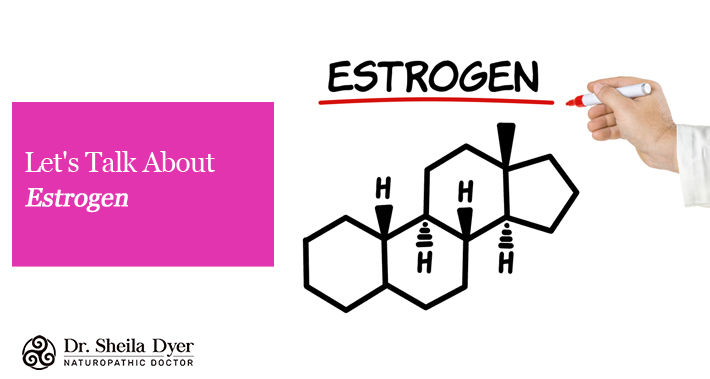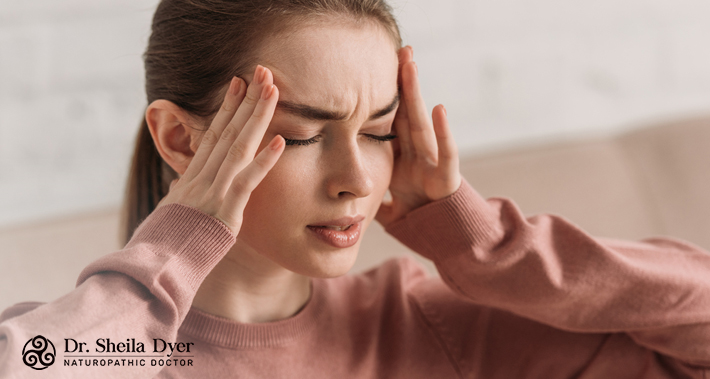Estrogen is an important sex hormone regardless of your gender
For cisgender women, it works with progesterone to maintain your sexual reproductive health.
Cisgender men, on the other hand, require a balance of it for testosterone, the dominant sex hormone in men, to operate effectively.
I’m Dr. Sheila Dyer, a naturopathic doctor for hormonal issues in Toronto, and if you’re dealing with an estrogen imbalance, I can help.
Now, let’s find out more about estrogen.
Note: Sex, gender, and gender identity are a spectrum. This article is mostly geared toward cisgender men and women, but it may also be applicable to transgender men and women, as well as nonbinary people and people with other gender identities. Dr. Sheila Dyer, ND, will take the time to understand your unique hormonal circumstances, and work with you to provide the highest quality of care that works for you while affirming your identity.
What Is Estrogen?
Estrogen is a sex hormone that all people have regardless of gender.
It is created by the ovaries, adrenal glands, and fat tissues, which is why women tend to create more of it than men.
It also helps other aspects of your body like cognitive health, bone health, and supports the function of your cardiovascular system.
What Are The 4 Types Of Estrogen?
What we call “estrogen” actually refers to four different hormones.
Below, you’ll find more about how each of these works.
Estrone (E1)
Estrone is the weakest form of estrogen, but it’s also the most malleable.
Your body can convert estrone into other types of estrogen as needed.
It’s most abundantly found in post menopausal women.
Estradiol (E2)
Estradiol is the most potent form of estrogen.
It’s created in all bodies, but it’s found in largest amounts in women during their reproductive years.
Estriol (E3)
Estriol is a type of estrogen that peaks during pregnancy right before birth.
Its main purpose is to grow your uterus and prepare the body for delivery.
Estetrol (E4)
Estetrol is the estrogen hormone found in a baby’s body in utero, created by their liver.
A small amount of estetrol will make its way in your body when you’re pregnant.
What Does Estrogen Do For A Woman?
Estrogen supports the reproductive system in women in a number of ways.
It stimulates the growth of your egg follicles in your ovaries.
Estrogen maintains the thickness of your vaginal wall and promotes lubrication.
It is also used by your body to form your breast tissue during puberty, and stops the flow of milk after weaning.
Finally, estrogen maintains the mucous membrane that lines your uterus and regulates both the flow and thickness of uterine mucus secretions.
What Does Estrogen Do For A Man?
If you’re a man, you might have heard about how estrogen is only for women.
But you need estrogen too!
In fact, it balances with testosterone to keep your own reproductive system working.
Together, both sex hormones control sex drive, erectile function, and the production of sperm.
What Happens When You Have Low Estrogen?
Symptoms of low estrogen in women can result in:
- Irregular periods
- Painful periods
- Infertility
- Osteoporosis
- Pain during intercourse
- Urinary tract infections
- Depression, anxiety, and other mental health challenges
In men, symptoms of low estrogen aren’t usually as big a cause for concern.
However, they can include:
- Chronic fatigue
- Irritability
- Depression
- Forgetfulness
- Sexual dysfunction
- Water retention
- Brain fog
Low estrogen in men can also sometimes cause excess belly fat and low libido.
RELATED: Fibromyalgia And Chronic Fatigue Treatments In Toronto
What Happens When You Have High Estrogen?
In women, symptoms of high estrogen include:
- Headaches
- Mood swings
- Bloating
- Hair loss
- Cold hands or feet
- Difficulty sleeping
- Fatigue
- Irregular menstruation
- Fibrocystic lumps in your breasts
- Breast swelling or tenderness
In men, on the other hand, symptoms of high estrogen can look like:
- Infertility
- Gynecomastia
- Erectile dysfunction
- Softening of skin
- Reduced body hair
- Depression
How Do You Balance Your Estrogen Levels?
If you suspect your estrogen is imbalanced, book your appointment with me, Dr. Sheila Dyer, ND.
We can run a lab test to get clear on your estrogen levels for your gender.
From there, we can take the appropriate steps to balance them.
This can include taking a look at what’s causing your estrogen imbalance and addressing it.
The most common cause of low estrogen is menopause – if that’s the case, we can explore whether bioidentical hormone replacement therapy for menopause is a good solution for you.
Other causes may include an eating disorder, exercising too aggressively, or an endocrine disorder.
Whatever it is that’s causing your estrogen imbalance, we’ll work together to bring balance to your body.
Book Your Appointment With Dr. Sheila Dyer, ND, Today
It’s important to make sure that your hormones are balanced.
If you’re feeling unusual symptoms and suspect that your estrogen is not where it should be, book your appointment with Dr. Sheila Dyer, ND, today.
If you have questions about naturopathic medicine, or would like to start with your first consultation, contact me, and let’s book an appointment.
Dr. Sheila Dyer, ND1080 Dovercourt Rd,
Toronto, ON M6H 2X8
(416) 554-5135
► https://g.page/DrSheilaDyerNd
Dr. Sheila Dyer is a Naturopathic Doctor and a practicing registered nurse offering holistic healthcare with a scientific focus

